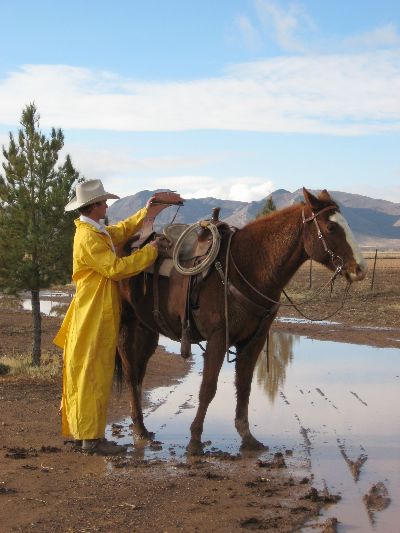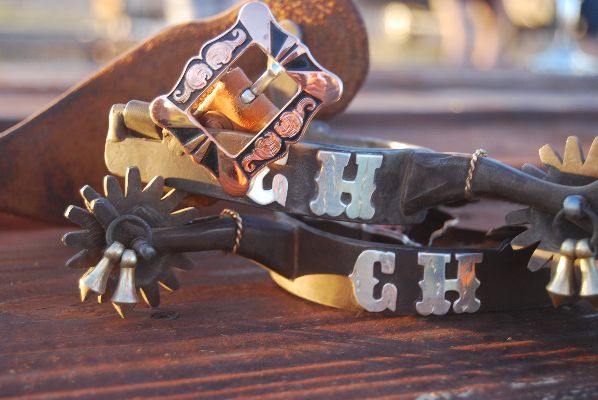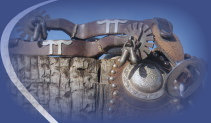|
PHILOSOPHY OF HORSE HANDLING UNDER THE MCLOUGHLIN SYSTEM
Remember Robert Frost's proverbial 'Fork in the Woods' poem?
"The Road not Taken"

Two roads diverged in a yellow wood,
And sorry I could not travel both
And be one traveler, long I stood
And looked down one as far as I could
To where it bent in the undergrowth;
Then took the other, as just as fair,
And having perhaps the better claim,
Because it was grassy and wanted wear;
Though as for that the passing there
Had worn them really about the same,
And both that morning equally lay
In leaves no step had trodden black.
Oh, I kept the first for another day!
Yet knowing how way leads on to way,
I doubted if I should ever come back.
(I shall be telling this with a sigh
Somewhere ages and ages hence:)
Two roads diverged in a wood, and I --
I took the one less traveled by,
And that has made all the difference.
Robert Frost
Cody and Lefty, morning after the rain, at school
This is more than a pleasant rhyme about a walk in the woods. It is a beautiful illustration or metaphor about crossroads or critical junctures that necessitate decisions that may change the dependable, the status quo, or what is predictable, though not comfortable. Some crossroads we can prepare for as they approach, such as marriage, the birth of a baby, changing jobs or schools. Others are unexpected, such as sudden death or sudden loss of health. The customary thought is, that you can plan for the expected; but if you survive the unexpected, you've done quite well.
Horse handling can parallel the private life. There are just as many expected as unexpected happenings in good horse handling, as in private life. The question is, which road will you take? Will you take the road of adversity? Can you plan for both the expected and unexpected in horse handling? When the situation or 'horse' cries, "change or else", which road will you take?
The McLoughlin system of horse handling is a process that will help provide the foundation for both the expected and the unexpected. Crisis management is not management. It leaves many victims in its path, and a bitter taste in the mouth of those who administer it. The best way to control crisis management is with your attitude.
There is a constructive and productive way, not necessarily effortless, but satisfying, that goes against the method of brutalizing horses and the quick training techniques that confuse and frustrate horses and students. Unfortunately, most trainers get horses to DO things! The more talented the horse, the easier it is to get him to DO what you want. This confuses the issue, but trainers think they do well when this happens. The problem is two-fold:
1. If the trainer is working with an average horse (and most horses are average), he has to get rough, jerk, spur
or ask the horse to do things before he is ready.
2. The next problem is: even though the trainer is using good, mechanically sound, correct and humane
techniques on above average horses, he's still 'getting' the horse to perform. (You need to give the horse time
to build trust and confidence in what you ask of him). Consequently, when the owner gets on the horse, he or
she can't ride him. If the owner CAN ride the horse, it doesn't last for long, if the objective was, 'getting the
job done'.
If you GET the horse to do what you are asking them for, you are only working on the physical side of training. When you take the time (TIME is a key word here, there can be no clock in training horses) to teach and show your horse what you want, you are working on the mental side of training. In order for a trainer to work successfully on the horse's brain, he must first have his mental attitude under complete control. Meaning, 'no ego'. Not getting mad, but being completely mellow around your horses; not only when you are riding and training them, but when you are grooming, leading from one stall to the other, feeding, loading on a trailer, and driving down the road. No matter how good a horse handler you are, until you put this factor together, you will not get a true union between you and your horse.
The art of Classical Stock Seat riding, unfortunately, is not the norm. Just like what the classical dressage world is
trying to accomplish, we must work hard to pursue good riding form and style, with efficient and balanced moves of the horse.
The horse has done remarkable things for man, which were, and are, unbelievable....but they have never asked for
much in return; just some good hay, feed and a clean stall. As true horsemen, we owe it to the horse to ride and show him in his grandest style! The number one element of successful horse handling, ATTITUDE! We are going to take a look at the 'Road less Traveled'...

______________________________________________________________________________________________________________
PHILOSOPHY OF THE STUDENT:
To come prepared to have a good time, to be open minded and to try to do what is asked of you. To be
physically and mentally alert. To be prepared to listen. Not to accept everything that Ron McLoughlin
(or the instructor) teaches or says, but to challenge what is presented to you. In that way, what is presented to you becomes first hand information, not passed along information. Therefore, giving to the clinic (or class) as much as you are taking, and enabling the instructor to learn as much from you, as you can learn from them. Lastly, but not least, the challenge will not always be directed at the instructor. You should challenge yourself and your horse, physically and mentally, with the techniques and theories that will enable you to become more of a working unit, remembering that you're on your way to becoming a classical stock seat rider.
PHILOSOPHY OF THE INSTRUCTOR:
To keep things safe and healthy for rider and horse. To make the clinic (class), fun to partake in. Layout enough information and demonstrate the techniques that it takes for good horse handling. To be honest with their evaluations of rider and horse and to leave the rider with an understanding of where they and their horse are, which direction they should try to go, and some tools and techniques on how to get there. To hold the student accountable for their actions and their part, according to their level or understanding and commitment. To help the rider develop good, honest, realistic visions and goals, and to motivate them to develop their commitment, while continuing to work on their horse handling. Knowing that not all students will like what they hear, the instructor must hold himself accountable, and be honest on all evaluations.
By Ron McLoughlin
|


